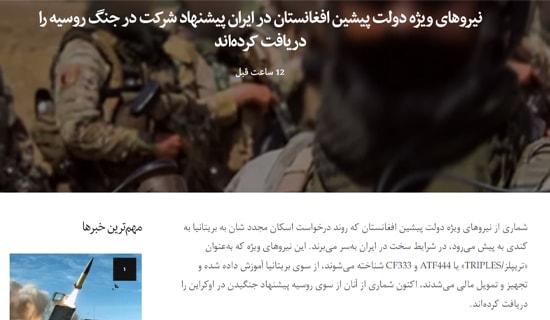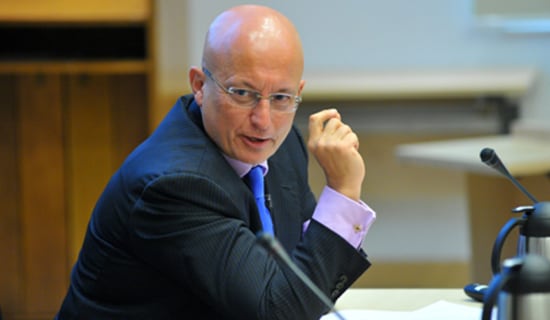In January 2019, Reuters uncovered information about Project Raven, a wide-ranging cyber offensive operation carried out by former NSA agents on behalf of the UAE.[1] They gathered huge amounts of documents concerning several targets, including activists, journalists, and foreign government entities in a few countries, such as Lebanon, South Africa,[2] Turkey, France, Yemen, Iran, Qatar, and Israel. The leaked documents uncovered the extent of the Qatari system of payments to politicians and influential public figures from different countries. Among the many figures was also Lebanese Druze politician Walid Jumblatt, who led the Progressive Socialist Party from 1977 until he was succeeded by his son Taymour in 2023.[3]
Below is a leaked Project Raven document, showing that in March 2018, the Qatari Embassy in Beirut informed the Qatari Foreign ministry that a "bank transfer in the amount of $10 million" had been made "for the purpose of funding" the "parliamentary election campaign" of Walid Jumblatt's Progressive Socialist Party (PSP). The document also stated that the "request" for the funding was "submitted by Mr. Walid Jumblatt." General elections were held in Lebanon on May 6, 2018. In those elections, the PSP won nine seats, among them Taymour Jumblatt.
Previously, in 2015, Wikileaks published leaked Saudi documents, dated from 2010 to 2012, which show the political fluctuation of Walid Jumblatt between Saudi Arabia and Qatar. In one of the leaked cables, the then head of Saudi General Intelligence, Muqrin bin Abdulaziz, stated that Jumblatt visited Qatar in 2012 with the goal of obtaining Qatari financial support for a popular movement carried out by the Druze in Syria against the Syrian regime.

May 13, 2018, Jumblatt received the Ambassador of Qatar to Lebanon, Ali bin Hamad Al-Marri. During the meeting, the Qatari Ambassador congratulated Jumblatt for the result of the PSP in the 2018 elections. (Source: Mofa.gov.qa)[4]

August 2, 2018, Jumblatt received the Ambassador of Qatar to Lebanon, Ali bin Hamad Al-Marri, on a farewell visit at his Clemenceau residence. In August 2018, Ali bin Hamad Al-Marri ended his tenure as Qatari Ambassador in Lebanon.[5] (Source: Archive.anbaaonline.com)[6]

August 2, 2018, Jumblatt received the Ambassador of Qatar to Lebanon, Ali bin Hamad Al-Marri, on a farewell visit at his Clemenceau residence. (Source: Archive.anbaaonline.com)[7]

On September 26, 2023, Walid Jumblatt, received the Qatari ambassador to Lebanon, Saud bin Abdul Rahman bin Faisal Thani Al Thani, at his Clemenceau residence. (Source: Alsaham.com)[8]
Project Raven Leaked Document
The following is a translation of an Arabic-language Qatari document leaked as part of Project Raven. The leaked document, dated March 7, 2018, in a letter sent by the Qatari Embassy in Beirut informing the Qatari Foreign Ministry that a "bank transfer in the amount of $10 million" was made "for the purpose of funding" the "parliamentary election campaign of the Progressive Socialist Party," which was then headed by Jumblatt. The document also stated that the "request" for the funding was "submitted by Mr. Walid Jumblatt."
"The Embassy of the State of Qatar
"Beirut
"March 7, 2018
"Top Secret and Urgent
"The Qatari Embassy in Beirut conveys its warmest regards to the Foreign Ministry [of Qatar] – Financial Administration.
"In reference to the memo of the esteemed Foreign Ministry of Qatar No. w kh/5/0020133/2018, dated February 28, 2018, regarding accepting the request submitted by Mr. Walid Jumblatt, the head of the Progressive Socialist Party, and regarding your bank transfer in the amount of $10 million for the purpose of funding the upcoming parliamentary election campaign of the Progressive Socialist Party.
"The Embassy is honored to inform the esteemed Foreign Ministry that the amount of $10 million has been delivered to Mr. Walid Jumblatt. Please find enclosed a receipt for the sum on behalf of the recipient.
"The Qatari Embassy in Beirut takes this opportunity to reiterate to the esteemed Foreign Ministry its respect and its appreciation."
The document bears a stamp.

Wikileaks
In 2015, Wikileaks published cables from the Saudi Foreign Ministry, some of which were related to Walid Jumblatt. The cables, dated from 2010 to 2012, show the relationship at the time between Jumblatt and Saudi Arabia and between Jumblatt and Qatar. These Gulf states have a long history of financially supporting certain politicians and parties in Lebanon as a way of gaining influence. These leaks are known as the "Saudi Cables," which are internal Saudi Kingdom's correspondence, that is, among Saudi officials, in Arabic. It is worth noting that the regular Wikileaks page about the "Saudi Cables" is no longer online – the original link now shows an error message. This content was supposedly acquired by the "Yemen Cyber Army," which is allegedly a front for an Iranian hacking organization.
The news about the cables relating to Jumblatt was broken by pro-Hezbollah Lebanese newspaper Al-Akhbar, which fully reported about the content of each document.[9] In a 2010 cable, issued by then Foreign Minister Saud Al-Faisal, the latter treats Jumblatt quite coldly, even though the relationship between the two parties did not suffer a full break at the time. In that period, Jumblatt was part of the Saudi-backed government of President Saad Al-Hariri. Furthermore, Saad Al-Hariri, Walid Jumblatt, and Samir Geagea, as well as other prominent Lebanese figures, were part of The March 14 Alliance, which was formed in 2005 and its members were initially united by an anti-Syrian regime stance.
At the time that the Saudi cable was issued, Lebanon was witnessing a Saudi-Syrian reconciliation. The New York Times wrote in that period: "Half a decade later, however, the Hariri case [i.e., the 2005 killing of Prime Minister Rafik Hariri] has made little progress toward justice. Lately, Syria has reasserted its power in Beirut after years of trying to destabilize a government dominated by its political foes. In December, Saad Hariri, Lebanon's prime minister and Rafik's son, met with Syria's president, Bashar Al-Assad, acceding to the reconciliation between his own political sponsor, Saudi Arabia, and Damascus making Lebanon less likely to point the finger at Syria for the killing."[10]
In a cable, Foreign Minister Saud Al-Faisal explained that Lebanese Minister Ghazi Aridi, also a key Jumblatt advisor, suggested that this "reconciliation" between Hariri and Al-Assad worried Jumblatt, which felt that he was "left alone." Aridi further suggested that Jumblatt's discomfort may have been mitigated by the Kingdom's agreement to meet Jumblatt's request to visit Saudi Arabia with his son Taymour and meet with the king and with Saud Al-Faisal. The cable added that Jumblatt's fears may lead to negative results that affect the political process led by Hariri. Hence, Al-Faisal proposed granting Jumblatt's request to visit the kingdom.
However, at the beginning of 2011, the relationship between Jumblatt and Saudi Arabia was severed, after the Druze politician participated in the Hezbollah-led "coup" against the Saudi-backed government of Prime Minister Saad Hariri and the naming of President Najib Mikati as his successor. The relationship remained severed until the crisis erupted in Syria. A year later, in January 2012, Jumblatt visited the Qatari capital, Doha, and the Saudi ambassador in Beirut, Ali Awad al-Asiri.
A report submitted by then head of the Saudi General Intelligence Muqrin bin Abdulaziz, to the then King Abdullah bin Abdulaziz explains what happened during Jumblatt's meeting with the emir of Qatar, which was related to the Syrian war.
Muqrin wrote: "1.From his recent visit to the State of Qatar and his meeting with Qatari officials, Jumblatt aims to obtain Qatari financial support for any popular movement carried out by the Druze in Syria.
"2. There is coordination between Jumblatt and the Druze in Syria, taking advantage of the geographical contiguity and human communication between the Druze Rashaya region [an administrative district in the Beqaa Governorate] in Lebanon and the [mainly Druze populated] Al-Suwayda region in Syria.[11]
"3. Jumblatt intends to provide part of the Qatari support to buy weapons for the Druze in Syria, as well as to support defectors from the regular army to join the Free Syrian Army, and thus confront the regime by going out in demonstrations in support of the uprising."
In March 2012, a cable sent by Saud al-Faisal to the Saudi king stated: "On the other hand, Sheikh Ahmed Al-Assir [a radical Salafist Sheikh who was sentenced to death in Lebanon in 2017 for leading the Islamists in their June 2013 clashes with the Lebanese Army, in which 18 soldiers and 11 militiamen were killed][12] staged a sit-in in Beirut against the Syrian regime, and there are those who say that Sheikh Al-Assir was moved by the encouragement of Mr. Walid Jumblatt and Qatari funding, which led Mr. Walid Jumblatt's office to deny any relationship with organizing or urging the sit-in." This is the period when various Arab regimes, including Qatar, sought to strengthen opposition to the Assad regime in the early stages of what would become the Syrian Civil War.
However, the denial did not convince Saudi Arabia, as Al-Faisal added: "It seems that Mr. Walid Jumblatt aims to put pressure on Mrs. Bahia Hariri [Lebanese politician and sister of former Lebanese Prime Minister Rafik Hariri, who was supported by Saudi Arabia] because Sheikh Al-Assir is from Sidon, the stronghold of the Hariri family."
On March 4, 2012, a royal decree rejected a proposal submitted on January 14 of that year by the Saudi ambassador in Beirut to restore communication between Saudi Arabia and Jumblatt. Two days after the rejection, the ambassador sent a cable saying that Jumblatt wanted to visit Saudi Arabia. The Saudi ambassador stated that "Jumblatt no longer agrees with the orientations of the Syrian regime, but has positions in favor of the Syrian opposition, and it is appropriate to notify him of the Kingdom's appreciation of his current orientations that are in the interest of the Kingdom's allies."
In April 2012, Jumblatt was pardoned by Saudi Arabia, and Foreign Minister Saud Al-Faisal received him in Jeddah. A few days later, Saudi Deputy Foreign Minister Abdulaziz bin Abdullah sent a cable to Al-Faisal informing him that he had received a call from US Assistant Secretary of State Jeffrey Feltman, informing him that he had "received an email message from Mr. Walid Jumblatt following Jumblatt's meeting with Your Highness on Tuesday, April 24, where Mr. Jumblatt stated to him that he had expressed to Your Highness his apology for his previous positions and that he was ready to cooperate and work in accordance with the Kingdom's view of the situation in the region, especially in the Lebanese arena. Mr. Feltman hopes to confirm this information and the Kingdom's view of how to deal with Mr. Jumblatt because the American side wants to agree with the Kingdom in this regard."
A Saudi official commented on this cable in his own handwriting, stating the following: "Despite what [Jumblatt] has done and its [political] fluctuations, the March 14 alliance, as its president said, needs the Druze, otherwise they would have lost the mountain [region], and this means that [the reconciliation with Jumblatt] will strengthen [March 14 alliance] chances of success in the elections."

(Source: Wikileaks)
*Anna Mahjar-Barducci is a MEMRI Senior Research Fellow
[1] See MEMRI Inquiry & Analysis Series No. 1734, 'Project Raven' – The Origin Of The Qatari Government Letters Leak, By Yigal Carmon, December 22, 2023.
[2] See MEMRI Inquiry & Analysis Series No. 1735, Exchange Between Former South African President Mbeki And Qatar Confirms The Veracity Of The Raven Project Leaks, December 27, 2023.
[3] The new PSP leader is Walid Jumblatt's son, Taymour Jumblatt.
[4] Mofa.gov.qa/%D8%AC%D9%85%D9%8A%D8%B9-%D8%A3%D8%AE%D8%A8%D8%A7%D8
%B1-%D8%A7%D9%84%D9%88%D8%B2%D8%A7%D8%B1%D8%A9/%D8%A7%D9%84%D8%A
A%D9%81%D8%A7%D8%B5%D9%8A%D9%84/2018/05/13/%D8%B1%D8%A6%D9%8A%D8%B3-%
D8%A7%D9%84%D8%AD%D8%B2%D8%A8-%D8%A7%D9%84%D8%AA%D9%82%D8%AF%D9%85%
D9%8A-%D8%A7%D9%84%D8%A5%D8%B4%D8%AA%D8%B1%D8%A7%D9%83%D9%8A-%D8%A7%D9
%84%D9%84%D8%A8%D9%86%D8%A7%D9%86%D9%8A-%D9%8A%D9%84%D8%AA%D9%82%D9%
8A-%D8%B3%D9%81%D9%8A%D8%B1-%D9%82%D8%B7%D8%B1, May 13, 2018.
[5] Ali bin Hamad Al Marri has been Qatari Ambassador in Lebanon from 2013 to 2018. From 2018 to 2023, Ali bin Hamad Al Marri has been the Qatari Ambassador in Albania. Beirut.embassy.qa/en/the-embassy/former-ambassadors; Tirana.embassy.qa/en/the-embassy/former-ambassadors
[6] Archive.anbaaonline.com/?p=655311, August 2, 2018.
[7] Archive.anbaaonline.com/?p=655311, August 2, 2018.
[8] Alsaham.com/archives/858, September 26, 2023.
[9] Al-akhbar.com/Politics/22998, June 23, 2015.
[10] Nytimes.com/2010/02/14/opinion/14young.html, February 13, 2010.
[11] Al-Akhbar daily noted: "There is no geographical contiguity between the Syrian province of Al-Suwayda and the Lebanese region of Rashaya, as they are separated by the territory of the Syrian provinces of Daraa and Rif Dimashq."
[12] Today.lorientlejour.com/article/1351644/sheikh-al-assir-supporters-protest-in-saida-demanding-his-release.html





